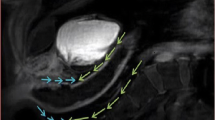Abstract
PURPOSE: Total mesorectal excision has been advocated for rectal cancer, but its use in upper rectal and rectosigmoid tumors remains a point of debate. METHODS: One hundred seventeen patients with rectal cancers were subjected to a prospective policy of total mesorectal excision for mid and low rectal cancers and a wide (5 cm) distal margin mesorectal excision for upper rectal and rectosigmoid cancers. RESULTS: Forty-one patients underwent ultralow anterior resection, 10 underwent abdominoperineal excision, 64 had anterior resection and 2 had Hartmann's procedure. The median follow-up was 39 months. Forty-three patients had a defunctioning ileostomy. Three patients (7.3 percent) had anastomotic leaks after ultralow anterior resection with total mesorectal excision. Ninety-three patients had palliative resections. There were four locoregional recurrences in this group, giving an actuarial locoregional recurrence rate of 9.3 percent at five years. The actuarial locoregional recurrence rate after anterior resection was 6.5 percent at five years. The actuarial five-year cancer-specific survival rate was 81.4 percent at five years. CONCLUSION: These results demonstrate that a policy of wide excision of the mesorectum for upper rectal and rectosigmoid cancer and total mesorectal excision for mid and low rectal cancer is associated with a low locoregional recurrence rate and may be as efficacious as routine total mesorectal excision for all rectal cancers.
Similar content being viewed by others
References
Heald RJ, Moran BJ, Ryall RD, Sexton R, McFarlance JK. Rectal cancer: the Basingstoke experience of total mesorectal excision, 1978–1997. Arch Surg 1998;133:894–9.
Arbman G, Nilsson E, Hallböök O, Sjödahl R. Local recurrence following total mesorectal excision for rectal cancer. Br J Surg 1996;63:375–9.
Arenas RB, Fischera H, Mhoon D, Michelassi F. Total mesenteric excision in the surgical treatment of rectal cancer. Arch Surg 1998;133:608–12.
Enker WE, Thaler H, Cranor M, Polyak T. Total mesorectal excision in the operative treatment of carcinoma of the rectum. J Am Coll Surg 1995;181:335–46.
Aitken RJ. Mesorectal excision for rectal cancer. Br J Surg 1996;83:214–26.
Dixon AR, Maxwell WA, Thornton Holmes J. Carcinoma of the rectum: a 10-year experience. Br J Surg 1991;78:308–11.
Jatzko G, Lisborg P, Welte V. Improving survival rates for patients with colorectal cancer. Br J Surg 1992;79:588–91.
Cawthorn SJ, Parums DV, Gibbs NM,et al. Extent of mesorectal spread and involvement of lateral resection margin as prognostic factors after surgery for rectal cancer. Lancet 1990;335:1055–9.
Hainsworth PJ, Egan MJ, Cunliffe WJ. Evaluation of a policy of total mesorectal excision for rectal and rectosigmoid excision for rectal and rectosigmoid cancers. Br J Surg 1997;84:652–6.
Lopez-Kostner F, Lavery IC, Hool GR, Rybicki LA, Fazio VW. Total mesorectal excision is not necessary for cancers of the upper rectum. Surgery 1998;143:612–7.
Reynolds JV, Joyce WP, Dolar J, Sheahan K, Hyland JM. Pathological evidence in support of total mesorectal excision in the management of rectal cancer. Br J Surg 1996;83:1112–5.
Scott N, Jackson P, AI-Jaberi T, Dixon MF, Quirke P, Finan PJ. Total mesorectal excision and local recurrence: a study of tumour spread in the mesorectum distal to rectal cancer. Br J Surg 1995;82:1031–3.
Hida J, Yasutomi M, Maruyama T,et al. Lymph node metastases detected in the mesorectum distal to carcinoma of the rectum by the clearing method: justification of total mesorectal excision. J Am Coll Surg 1997;184:584–8.
Heald RJ, Husband EM, Ryall RD. The mesorectum in rectal cancer surgery. Br J Surg 1982;69:613–6.
Karanjia ND, Corder AP, Beavin P, Heald RJ. Leakage from low stapled anastomosis after total mesorectal excision for carcinoma of the rectum. Br J Surg 1994;81:1224–6.
Heald RJ, Ryall RD. Recurrence and survival after total mesorectal excision for rectal cancer. Lancet 1986;1:1479–82.
Dukes CE. The classification of cancer of the rectum. J Pathol Bacteriol 1932;35:323–32.
Bell PR. Surgical research and randomised trials. Br J Surg 1997;84:737–8.
Hainsworth PJ. Evaluation of a policy of total mesorectal excision for rectal rectosigmoid cancers [letter]. Br J Surg 1997;84:1748–9.
Adam IJ, Mohamdee MO, Martin IG,et al. Role of circumferential margin involvement in the local recurrence of rectal cancer. Lancet 1994;344:707–11.
Ng IO, Luk IS, Yuen ST,et al. Surgical lateral clearance in resected rectal carcinomas. Cancer 1993;71:1972–6.
De Hass-Kock DF, Baeten CG, Jager JJ,et al. Prognostic significance of radial margin of clearance in rectal cancer. Br J Surg 1996;83:781–5.
Author information
Authors and Affiliations
About this article
Cite this article
Leong, A.F.P.K. Selective total mesorectal excision for rectal cancer. Dis Colon Rectum 43, 1237–1240 (2000). https://doi.org/10.1007/BF02237427
Issue Date:
DOI: https://doi.org/10.1007/BF02237427




